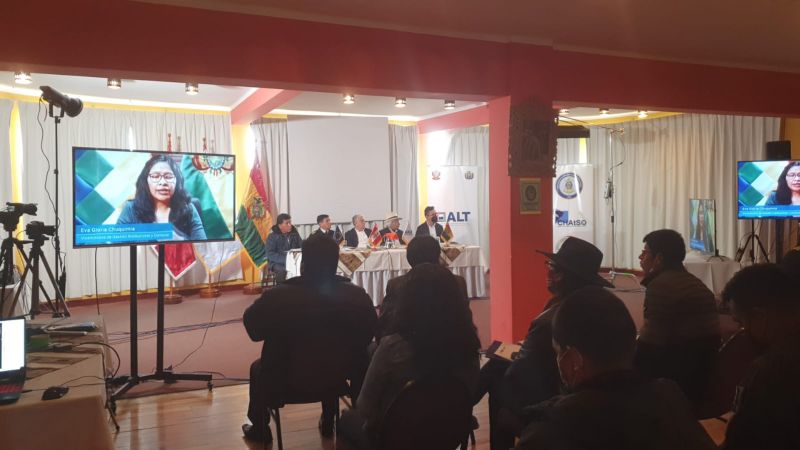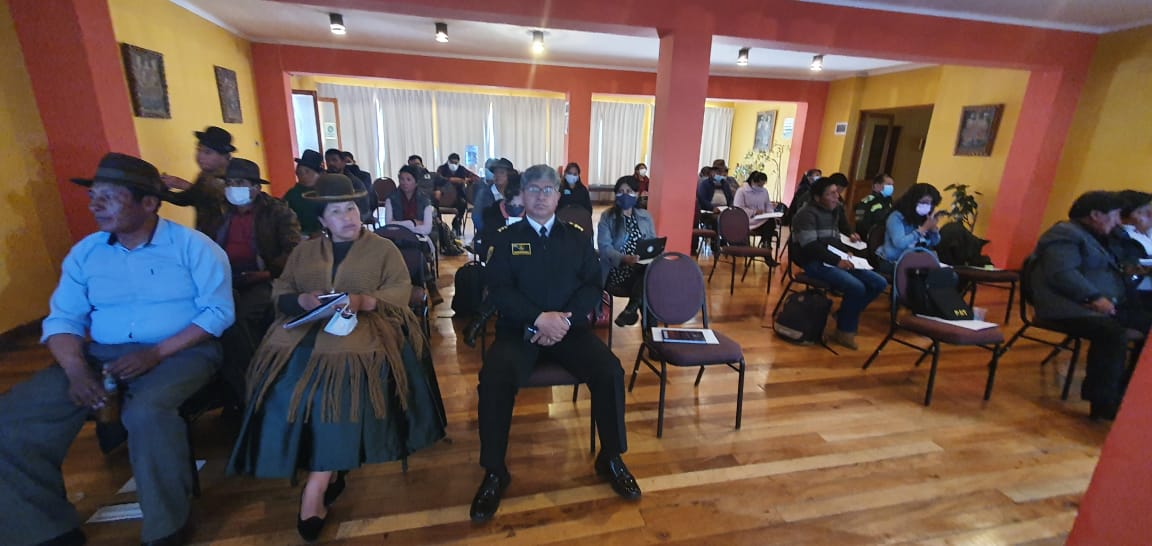News
On Thursday 25 November, the bi-national Lake Titicaca Authority organised a public meeting attended by authorities from Peru, Bolivia and experts in cooperation between Latin America and Europe. Virtually all the participants agreed on two issues: the critical situation of climatic and socioeconomic vulnerability in which the region finds itself and the need for trust between the different actors that have an impact on it. “Titicaca unites us, it has to be treated with respect and specific actions,” said Juan Ocola Salazar, director of the Lake Titicaca Authority.

In pursuit of this goal, two cooperation programmes supported the organisation of this meeting – the Governance Area of EUROsociAL+ and EUROFRONT, both coordinated by FIIAPP and financed by the European Union. Representatives of the Foreign Ministries of Bolivia and Peru, local authorities on the shores of Lake Titicaca and other agents who live daily with their problems joined the voices of the other experts, highlighting the environmental, economic and security aspects. The aim: to move towards the creation of a cross-border strategy for the security, governance and development of this region that contributes to improving people's lives and promoting social cohesion. To this end, a first proposal for a strategy that had been worked on for months and submitted to open debate during the session was presented.
The presence of representatives of the respective Foreign Ministries of Bolivia and Perú underscored the importance of the meeting for both countries. The session was opened by Eva Gloria Chuquimia, Bolivia’s Vice Minister of Institutional and Consular Management, and Ambassador Ignacio Higueras, Principal Advisor of the Vice Ministerial Office of Peru. In their speeches, both recalled the signatures of their respective presidents on October 30 in La Paz recognising the importance of Lake Titicaca in the history of the integration of both nations and for the peoples that live there.

Synergies between different Latin America – European Union cooperation programmes
The meeting, held simultaneously in Copacabana and Puno, highlighted the need for joint action. Firstly through the dialogue between the nations represented in the Lake Titicaca National Authority and secondly, by taking advantage of the synergies created between the participating European Union programmes. Such is the case of EUROFRONT and EUROsociAL+, who are seeking to contribute to an institutional strengthening in Latin America from two complementary perspectives.
Both perspectives clearly come together at Lake Titicaca. Regarding EUROsociAL+’s work, the region has to ensure access to water for human consumption and basic sanitation, in addition to working for the consolidation of cooperation networks, the strengthening of governance structures and economic and social development. These same networks are of vital importance to EUROFRONT, which works on the Desaguadero border that separates the Peruvian and Bolivian cities of the same name. This border is very vulnerable, with a number of points that are particularly critical in terms of irregular flows, criminal activity and processes that pose a risk to human rights.
Conclusions from the meeting in the words of those taking part
Juan Manuel Santomé, director of EUROsociAL+, highlighted the fact that the border regions of the European Union and Latin America face similar problems from a comparative perspective in terms of water resources as well as sharing a series of common characteristics – different levels of development, richness in biodiversity and climatological diversity and vulnerability to extreme weather events. “Countries need to cooperate in order to jointly address common challenges,” he said.
In the words of José Antonio Cambronero, director of Component 1 of the EUROFRONT programme, “security is essential in this process, because without it there can be no economic development.” He went on to say “In this direction the EUROFRONT programme contributes by providing European experience and supporting the work that is already being launched by regional and national authorities.”
During the debate on the bi-national strategy presented at the meeting, the views of the local mayors, governors, producers’ associations and civil society who attended were also heard. Together, they expressed their concern for the present and future of the region, demanding an active role in the future definition of the aforementioned strategy.
Finally, Juan Ocola Salazar, as director of the Lake Titicaca Authority, stressed the urgent need to intensify the fight against poverty and drastically improve the sanitary system in the Lake Titicaca region. “The first draft of the strategy presented here must be discussed, addressed and subsequently assimilated. Its content has to be agreed by Peru, Bolivia and the agents involved in water management,” he said, bringing to a close this important meeting between two countries seeking to reaffirm their commitment to cooperation.
Line of action
Social media news

